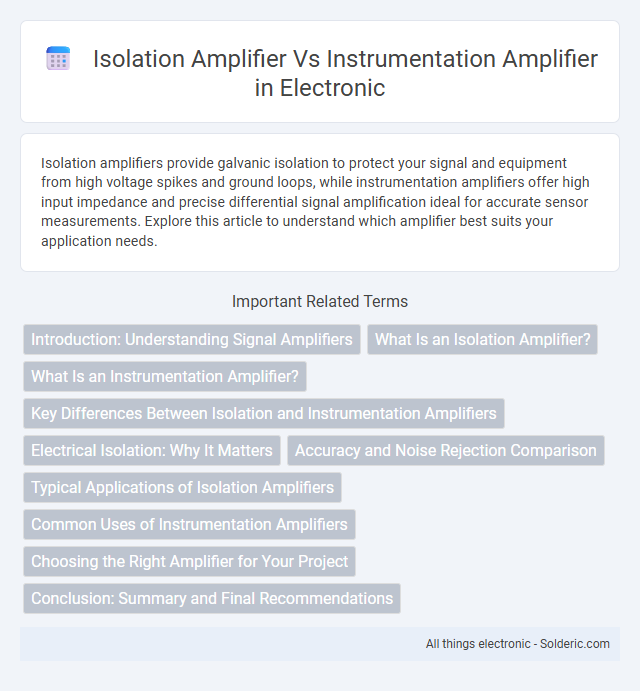Isolation amplifiers provide galvanic isolation to protect your signal and equipment from high voltage spikes and ground loops, while instrumentation amplifiers offer high input impedance and precise differential signal amplification ideal for accurate sensor measurements. Explore this article to understand which amplifier best suits your application needs.
Comparison Table
| Feature | Isolation Amplifier | Instrumentation Amplifier |
|---|---|---|
| Primary Function | Electrical isolation with signal amplification | Precision differential signal amplification |
| Galvanic Isolation | Yes, provides isolation barrier | No, shares common ground |
| Application | Medical devices, noisy environments, ground loop elimination | Sensor signal conditioning, low-level signal amplification |
| Input Type | Differential or single-ended | Typically differential |
| Accuracy | Moderate to high, depends on isolation technique | High precision, low offset and noise |
| Frequency Response | Limited by isolation method (optical, magnetic) | Wide bandwidth |
| Typical Gain | Fixed or adjustable, usually low to moderate | Adjustable gain with resistor networks |
| Cost | Higher, due to isolation components | Lower to moderate |
Introduction: Understanding Signal Amplifiers
Isolation amplifiers provide galvanic separation between input and output, preventing ground loops and enhancing signal integrity in noisy environments. Instrumentation amplifiers offer high input impedance and precise differential signal amplification, ideal for accurate measurement in sensor applications. Your choice depends on whether electrical isolation or precise low-level signal amplification is the primary requirement.
What Is an Isolation Amplifier?
An isolation amplifier is a device designed to transfer an analog signal from one circuit to another without a direct electrical connection, providing galvanic isolation to protect components from high voltage differences and reduce noise interference. Unlike an instrumentation amplifier, which primarily focuses on precise differential signal amplification with high input impedance and common-mode rejection, an isolation amplifier ensures signal integrity and safety by electrically isolating the input and output stages. This makes isolation amplifiers essential in medical equipment, industrial process controls, and measurement systems where patient safety and equipment protection are critical.
What Is an Instrumentation Amplifier?
An instrumentation amplifier is a precision amplifier designed for accurate and stable low-level signal amplification, often used in sensor signal conditioning and medical instrumentation. It features high input impedance, low noise, and excellent common-mode rejection ratio (CMRR), enabling precise measurement of differential signals in noisy environments. Unlike isolation amplifiers, instrumentation amplifiers do not provide galvanic isolation but focus on precise differential gain with minimal interference.
Key Differences Between Isolation and Instrumentation Amplifiers
Isolation amplifiers provide galvanic isolation to protect sensitive measurement systems from high voltage transients and ground loops, enhancing safety and signal integrity. Instrumentation amplifiers offer high input impedance, low offset voltage, and precise differential signal amplification, making them ideal for accurate low-level signal measurement. While isolation amplifiers prioritize electrical separation and noise immunity, instrumentation amplifiers emphasize amplification accuracy and stability in signal conditioning applications.
Electrical Isolation: Why It Matters
Isolation amplifiers provide galvanic isolation between input and output, preventing ground loops and enhancing safety in sensitive measurements, critical in medical devices and industrial controls. Instrumentation amplifiers offer high input impedance and precise differential amplification but lack electrical isolation, making them susceptible to noise and potential ground loop interference. Electrical isolation matters to ensure signal integrity, protect equipment from high voltages, and maintain operator safety in complex electronic systems.
Accuracy and Noise Rejection Comparison
Instrumentation amplifiers provide superior accuracy with high input impedance and precise gain settings, making them ideal for low-level signal amplification. Isolation amplifiers excel in noise rejection by electrically isolating the input from the output, effectively reducing ground loop interference and common-mode noise in harsh environments. Your choice depends on whether accuracy or noise immunity is the priority for your measurement application.
Typical Applications of Isolation Amplifiers
Isolation amplifiers are commonly used in medical equipment, industrial process controls, and high-voltage measurement systems to ensure patient safety and protect sensitive electronics from ground loops and electrical noise. These amplifiers provide galvanic isolation, making them ideal for isolating signals in hazardous environments or when measuring weak analog signals in the presence of high common-mode voltages. Typical applications include EEG monitoring, PLC signal conditioning, and voltage transducer isolation in power electronics.
Common Uses of Instrumentation Amplifiers
Instrumentation amplifiers are commonly used in medical devices, such as ECG and EEG machines, to accurately amplify low-level biopotential signals while rejecting noise and interference. They are essential in industrial process controls for precise sensor signal conditioning, ensuring stable and reliable measurements in harsh environments. Additionally, instrumentation amplifiers play a critical role in strain gauge and load cell applications, providing high input impedance and excellent common-mode rejection for accurate force and pressure assessments.
Choosing the Right Amplifier for Your Project
Isolation amplifiers provide galvanic isolation to protect sensitive electronics from high voltages and noise, making them ideal for medical, industrial, and power measurement applications. Instrumentation amplifiers offer high input impedance, precise gain, and excellent common-mode rejection, which are critical for accurately amplifying low-level differential signals in sensor interfaces and data acquisition systems. Selecting the right amplifier depends on factors such as the need for electrical isolation, signal integrity, noise tolerance, and the specific requirements of your measurement environment.
Conclusion: Summary and Final Recommendations
Isolation amplifiers excel in providing galvanic isolation to protect sensitive measurement equipment and ensure safety in high-voltage environments, while instrumentation amplifiers offer superior accuracy and low-noise amplification for precise signal conditioning. Your choice depends on whether electrical isolation or signal fidelity is the primary requirement in your application. For medical devices and industrial sensors where safety and noise immunity are critical, isolation amplifiers are recommended, whereas instrumentation amplifiers suit laboratory and low-level signal measurements needing high precision.
isolation amplifier vs instrumentation amplifier Infographic

 solderic.com
solderic.com